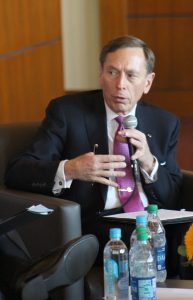Government experts discuss national security
The Forum was filled Wednesday night with attendees waiting for the U.S. National Security Challenges and Opportunities discussion to begin.
The two panelists — retired Gen. David Petraeus and U.S. Rep. Adam Schiff — were ready to tackle the most pressing policy challenges awaiting the next U.S. president. The moderator, Dan Schnur, director of the Jesse M. Unruh Institute of Politics, presented the two panelists with a series of lightning-round questions. They were advised to answer within a minute.
In the first question, they discussed the Battle for Mosul, the operation to retake the Iraqi city of Mosul from ISIS. Petraeus suggested that the army will eventually take back the city, but it will be a question of time. Schiff agreed and pointed out that there are “three dimensions” of challenges facing the United States in the region: ideological, political and military. Militarily, he believes that the Iraqis will regain their city with U.S. support, but the other two dimensions will pose more of an issue.
The panelists also spoke about Russian President Vladimir Putin’s goals in the Middle East. Schiff explained that Putin wants to preserve Russian military presence in Syria so it can be a world-stage player again. Putin, according to Schiff, views relations with the United States as a zero-sum game — every U.S. win is a Russian loss. He also pointed out that the region must primarily transition away from Syrian President Bashar al-Assad by having leverage over Russia, which the United States doesn’t have yet, and Petraeus agreed.

Julia Erickson | Daily Trojan
Securing the future · Former Gen. David Petraeus spoke about the continued U.S. presence in the Middle East at Wednesday’s talk.
“No successful diplomacy will be possible without a shift in the military context,” Petraeus said.
He suggested the possibility of using technology, like no-fly zones or anti-aircraft missiles, that he said would safeguard against Russia.
Schiff then brought up the issue of North Korea and how to deal with its nuclear programs. He explained that, despite huge sanctions in place, China is providing North Korea with an economic lifeline. What China doesn’t want, Schiff said, is U.S. military buildup in Asia, which is the approach the United States should take if China doesn’t stop its support for North Korea. Petraeus agreed with this viewpoint, maintaining that it’s not in China’s best desires to continue supporting North Korea.
China’s maritime claims in the South China Sea, however, prompted more complex and diplomatic responses from both panelists.
“Revolutionary powers, [such as] North Korea, Iran, Russia, and China are not satisfied with the status quo,” Petraeus said.
However, no hawkish statements should be made, he argued, since the United States and China are close trading partners. Schiff echoed the sentiment, but said that the United States should continue freedom of navigation exercises to show that it does not accept China’s claims.
Schnur then directed the conversation toward the question of whether the United States should further entrench itself in the Yemeni civil war. Although both hoped for a cease-fire, Schiff argued against intervention, while Petraeus argued that the United States should issue more backing for the Saudis against the Houthi separatists.
The talk then shifted to Iran and the nuclear deal. Petraeus affirmed that the deal has some short-term benefits, but should be taken a step further by saying that Iran will never be allowed to expand its weapons as a consequence of the country’s “malign activity.” Schiff explained that there are two parts to developing a bomb: the mechanism and the industrial enrichment. He pointed out that Iran can “cheat” the deal by working on developing the mechanisms of the bomb.
Regarding the presence of U.S. troops in Afghanistan, both panelists agreed that troops will need to remain longer, because of the region’s instability. Petraeus said that there are two components required to fund the troops: blood and treasure. The United States needs to find a long-term strategy to minimize both if it is going to stay in the region, Petraeus said.
Speaking about Benghazi and its role in the presidential election, both panelists lamented the lives lost and argued that the American deaths were the responsibility of terrorists. Schiff lamented how the topic of Benghazi was being turned into “a political circus” in the election, disrespecting the lives lost.
